

Concept Papers in Research: Deciphering the blueprint of brilliance
Concept papers hold significant importance as a precursor to a full-fledged research proposal in academia and research. Understanding the nuances and significance of a concept paper is essential for any researcher aiming to lay a strong foundation for their investigation.
Table of Contents
What Is Concept Paper
A concept paper can be defined as a concise document which outlines the fundamental aspects of a grant proposal. It outlines the initial ideas, objectives, and theoretical framework of a proposed research project. It is usually two to three-page long overview of the proposal. However, they differ from both research proposal and original research paper in lacking a detailed plan and methodology for a specific study as in research proposal provides and exclusion of the findings and analysis of a completed research project as in an original research paper. A concept paper primarily focuses on introducing the basic idea, intended research question, and the framework that will guide the research.
Purpose of a Concept Paper
A concept paper serves as an initial document, commonly required by private organizations before a formal proposal submission. It offers a preliminary overview of a project or research’s purpose, method, and implementation. It acts as a roadmap, providing clarity and coherence in research direction. Additionally, it also acts as a tool for receiving informal input. The paper is used for internal decision-making, seeking approval from the board, and securing commitment from partners. It promotes cohesive communication and serves as a professional and respectful tool in collaboration.
These papers aid in focusing on the core objectives, theoretical underpinnings, and potential methodology of the research, enabling researchers to gain initial feedback and refine their ideas before delving into detailed research.
Key Elements of a Concept Paper
Key elements of a concept paper include the title page , background , literature review , problem statement , methodology, timeline, and references. It’s crucial for researchers seeking grants as it helps evaluators assess the relevance and feasibility of the proposed research.
Writing an effective concept paper in academic research involves understanding and incorporating essential elements:
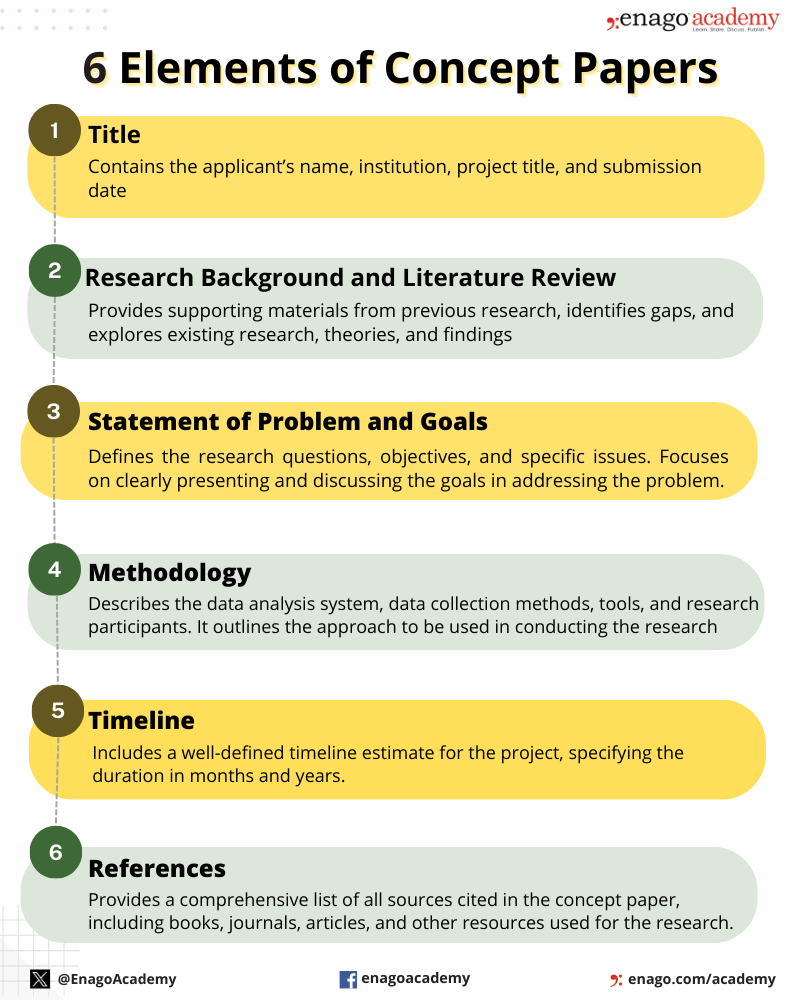
How to Write a Concept Paper?
To ensure an effective concept paper, it’s recommended to select a compelling research topic, pose numerous research questions and incorporate data and numbers to support the project’s rationale. The document must be concise (around five pages) after tailoring the content and following the formatting requirements. Additionally, infographics and scientific illustrations can enhance the document’s impact and engagement with the audience. The steps to write a concept paper are as follows:
1. Write a Crisp Title:
Choose a clear, descriptive title that encapsulates the main idea. The title should express the paper’s content. It should serve as a preview for the reader.
2. Provide a Background Information:
Give a background information about the issue or topic. Define the key terminologies or concepts. Review existing literature to identify the gaps your concept paper aims to fill.
3. Outline Contents in the Introduction:
Introduce the concept paper with a brief overview of the problem or idea you’re addressing. Explain its significance. Identify the specific knowledge gaps your research aims to address and mention any contradictory theories related to your research question.
4. Define a Mission Statement:
The mission statement follows a clear problem statement that defines the problem or concept that need to be addressed. Write a concise mission statement that engages your research purpose and explains why gaining the reader’s approval will benefit your field.
5. Explain the Research Aim and Objectives:
Explain why your research is important and the specific questions you aim to answer through your research. State the specific goals and objectives your concept intends to achieve. Provide a detailed explanation of your concept. What is it, how does it work, and what makes it unique?
6. Detail the Methodology:
Discuss the research methods you plan to use, such as surveys, experiments, case studies, interviews, and observations. Mention any ethical concerns related to your research.
7. Outline Proposed Methods and Potential Impact:
Provide detailed information on how you will conduct your research, including any specialized equipment or collaborations. Discuss the expected results or impacts of implementing the concept. Highlight the potential benefits, whether social, economic, or otherwise.
8. Mention the Feasibility
Discuss the resources necessary for the concept’s execution. Mention the expected duration of the research and specific milestones. Outline a proposed timeline for implementing the concept.
9. Include a Support Section:
Include a section that breaks down the project’s budget, explaining the overall cost and individual expenses to demonstrate how the allocated funds will be used.
10. Provide a Conclusion:
Summarize the key points and restate the importance of the concept. If necessary, include a call to action or next steps.
Although the structure and elements of a concept paper may vary depending on the specific requirements, you can tailor your document based on the guidelines or instructions you’ve been given.
Here are some tips to write a concept paper:
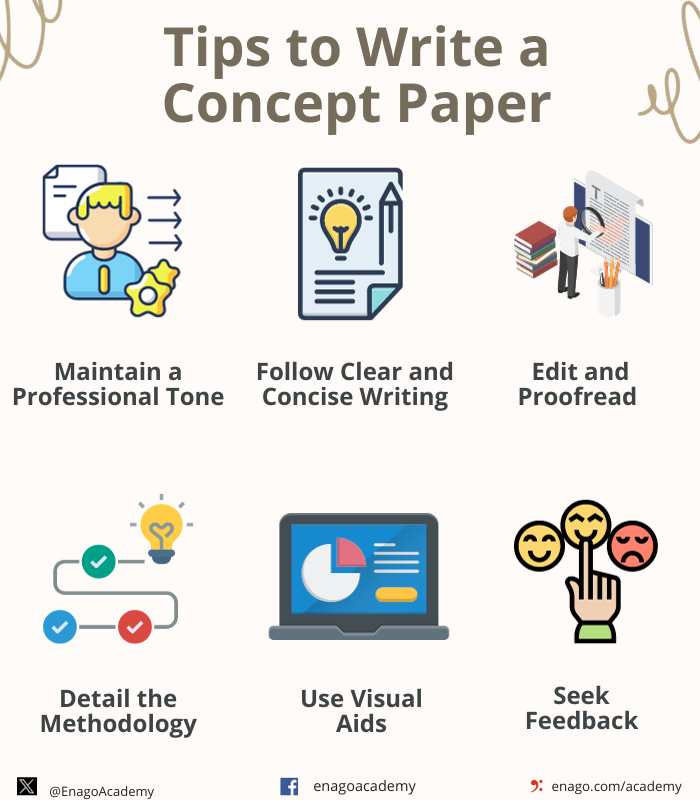
Example of a Concept Paper
Here is an example of a concept paper. Please note, this is a generalized example. Your concept paper should align with the specific requirements, guidelines, and objectives you aim to achieve in your proposal. Tailor it accordingly to the needs and context of the initiative you are proposing.
Download Now!
Importance of a Concept Paper
Concept papers serve various fields, influencing the direction and potential of research in science, social sciences, technology, and more. They contribute to the formulation of groundbreaking studies and novel ideas that can impact societal, economic, and academic spheres.
A concept paper serves several crucial purposes in various fields:
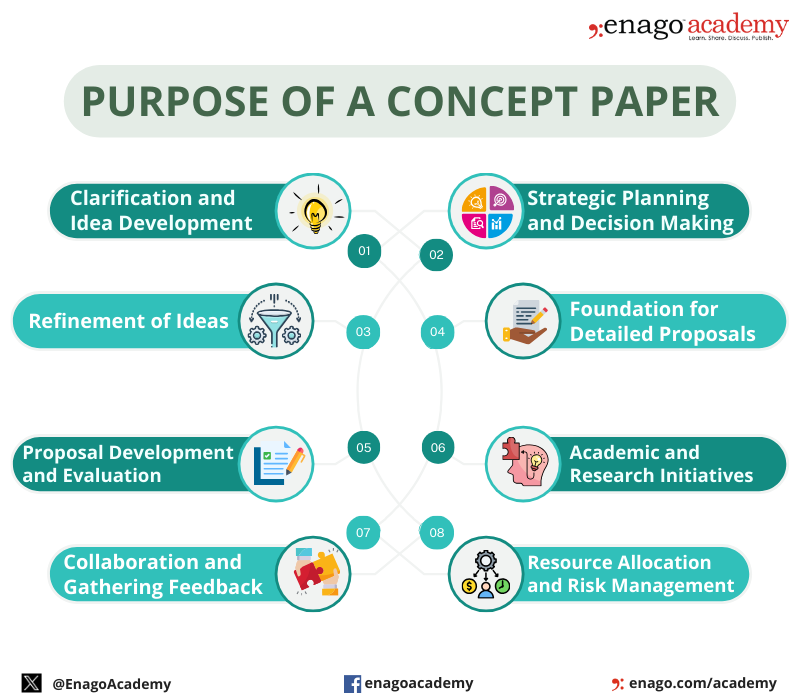
In summary, a well-crafted concept paper is essential in outlining a clear, concise, and structured framework for new ideas or proposals. It helps in assessing the feasibility, viability, and potential impact of the concept before investing significant resources into its implementation.
How well do you understand concept papers? Test your understanding now!
Fill the Details to Check Your Score

Role of AI in Writing Concept Papers
The increasing use of AI, particularly generative models, has facilitated the writing process for concept papers. Responsible use involves leveraging AI to assist in ideation, organization, and language refinement while ensuring that the originality and ethical standards of research are maintained.
AI plays a significant role in aiding the creation and development of concept papers in several ways:
1. Idea Generation and Organization
AI tools can assist in brainstorming initial ideas for concept papers based on key concepts. They can help in organizing information, creating outlines, and structuring the content effectively.
2. Summarizing Research and Data Analysis
AI-powered tools can assist in conducting comprehensive literature reviews, helping writers to gather and synthesize relevant information. AI algorithms can process and analyze vast amounts of data, providing insights and statistics to support the concept presented in the paper.
3. Language and Style Enhancement
AI grammar checker tools can help writers by offering grammar, style, and tone suggestions, ensuring professionalism. It can also facilitate translation, in case a global collaboration.
4. Collaboration and Feedback
AI platforms offer collaborative features that enable multiple authors to work simultaneously on a concept paper, allowing for real-time contributions and edits.
5. Customization and Personalization
AI algorithms can provide personalized recommendations based on the specific requirements or context of the concept paper. They can assist in tailoring the concept paper according to the target audience or specific guidelines.
6. Automation and Efficiency
AI can automate certain tasks, such as citation formatting, bibliography creation, or reference checking, saving time for the writer.
7. Analytics and Prediction
AI models can predict potential outcomes or impacts based on the information provided, helping writers anticipate the possible consequences of the proposed concept.
8. Real-Time Assistance
AI-driven chat-bots can provide real-time support and answers to specific questions related to the concept paper writing process.
AI’s role in writing concept papers significantly streamlines the writing process, enhances the quality of the content, and provides valuable assistance in various stages of development, contributing to the overall effectiveness of the final document.
Concept papers serve as the stepping stone in the research journey, aiding in the crystallization of ideas and the formulation of robust research proposals. It the cornerstone for translating ideas into impactful realities. Their significance spans diverse domains, from academia to business, enabling stakeholders to evaluate, invest, and realize the potential of groundbreaking concepts.
Frequently Asked Questions
A concept paper can be defined as a concise document outlining the fundamental aspects of a grant proposal such as the initial ideas, objectives, and theoretical framework of a proposed research project.
A good concept paper should offer a clear and comprehensive overview of the proposed research. It should demonstrate a strong understanding of the subject matter and outline a structured plan for its execution.
Concept paper is important to develop and clarify ideas, develop and evaluate proposal, inviting collaboration and collecting feedback, presenting proposals for academic and research initiatives and allocating resources.
I got wonderful idea
It helps a lot for my concept paper.
Information is key to the guidelines of a concept paper
Rate this article Cancel Reply
Your email address will not be published.

Enago Academy's Most Popular Articles

- Old Webinars
- Trending Now
- Webinar Mobile App
Mastering Research Funding: A step-by-step guide to finding and winning grants
Identifying relevant funding opportunities Importance of eligibility criteria Understanding the funder’s perspective Crafting a strong…

- Career Corner
Academic Webinars: Transforming knowledge dissemination in the digital age
Digitization has transformed several areas of our lives, including the teaching and learning process. During…

- Manuscripts & Grants
- Reporting Research
Mastering Research Grant Writing in 2024: Navigating new policies and funder demands
Entering the world of grants and government funding can leave you confused; especially when trying…

How to Create a Poster That Stands Out: Tips for a smooth poster presentation
It was the conference season. Judy was excited to present her first poster! She had…

Academic Essay Writing Made Simple: 4 types and tips
The pen is mightier than the sword, they say, and nowhere is this more evident…

Sign-up to read more
Subscribe for free to get unrestricted access to all our resources on research writing and academic publishing including:
- 2000+ blog articles
- 50+ Webinars
- 10+ Expert podcasts
- 50+ Infographics
- 10+ Checklists
- Research Guides
We hate spam too. We promise to protect your privacy and never spam you.
- Industry News
- Publishing Research
- AI in Academia
- Promoting Research
- Diversity and Inclusion
- Infographics
- Expert Video Library
- Other Resources
- Enago Learn
- Upcoming & On-Demand Webinars
- Open Access Week 2024
- Peer Review Week 2024
- Publication Integrity Week 2024
- Conference Videos
- Enago Report
- Journal Finder
- Enago Plagiarism & AI Grammar Check
- Editing Services
- Publication Support Services
- Research Impact
- Translation Services
- Publication solutions
- AI-Based Solutions
- Thought Leadership
- Call for Articles
- Call for Speakers
- Author Training
- Edit Profile
I am looking for Editing/ Proofreading services for my manuscript Tentative date of next journal submission:

Which among these would you prefer the most for improving research integrity?
Concept Paper: Definition, Parts, Format & How-To Guide
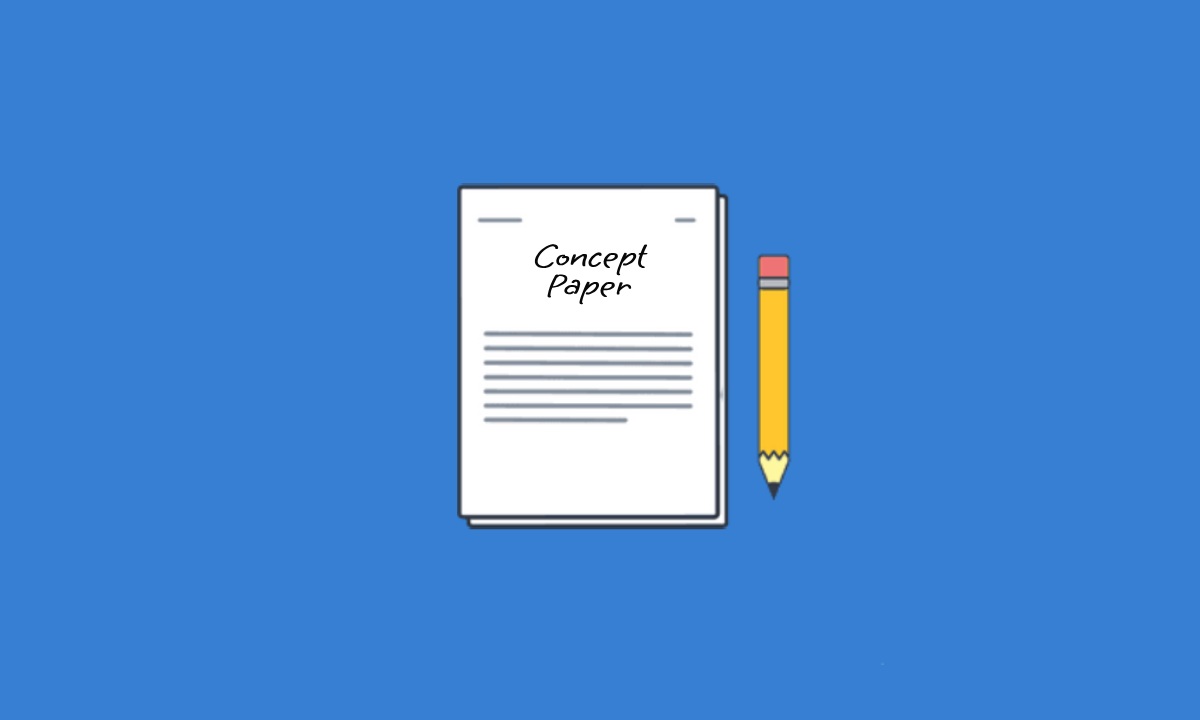
What is a Concept Paper?
A concept paper is a concise document that outlines a proposed research project or study. It serves as a preliminary plan, presenting the research problem, objectives, significance, and proposed methodology. The purpose of a concept paper is to communicate the central idea of the research to advisors, committees, or funding bodies for feedback or approval before proceeding with a full proposal or detailed research plan. It helps clarify the research direction and ensures that the study aligns with academic or institutional guidelines.
Table of Contents
Concept Paper Parts:
A concept paper in academic writing typically consists of the following key parts:
Title: A clear, concise title that reflects the focus of the research or project.
Introduction: Provides background information on the topic and highlights the significance of the research. It should introduce the problem or issue being addressed.
Problem Statement: Clearly defines the specific problem or gap in knowledge that the research seeks to address.
Objectives: Outlines the main goals or aims of the research, specifying what the study intends to accomplish.
Research Questions or Hypothesis: Presents the specific questions the research will answer or the hypothesis to be tested.
Methodology: Describes the research design, data collection methods, and analysis techniques to be used in the study.
Significance: Explains the importance of the research, highlighting its potential contribution to the field, academia, or society.
Literature Review (optional): Briefly summarizes existing studies or theories related to the research topic, demonstrating the gap the study will fill.
Budget and Timeline (optional): If applicable, includes a rough estimate of the costs and a timeline for completing the research.
These parts ensure the concept paper effectively communicates the core idea and plan for the research to relevant stakeholders.
Concept Paper Format:
The format of a concept paper can vary depending on the institution, funding body, or field of study, but it generally adheres to a standard structure. Below is a commonly used format for a concept paper in academic writing:
1. Title Page
- Project or Research Title
- Author’s Name and Affiliation
- Contact Information (if required)
2. Introduction
- Background of the study
- Brief context to the topic
- Importance or relevance of the topic
3. Problem Statement
- Clearly define the issue, problem, or gap in knowledge.
- Provide context, scope, and relevance of the problem.
4. Objectives
- State the overall aim and specific objectives of the study.
- Use bullet points for clarity (e.g., “To examine…”, “To identify…”, “To analyze…”).
5. Research Questions or Hypothesis
- List the primary research questions or hypotheses that the study will address.
6. Literature Review (Optional)
- Briefly summarize key studies related to your topic.
- Identify research gaps or areas of controversy.
7. Methodology
- Describe the research design (qualitative, quantitative, or mixed-methods).
- Specify the methods of data collection (e.g., surveys, interviews, experiments).
- Define the target population or sample and the sampling techniques.
- Outline the data analysis techniques.
8. Significance of the Study
- Explain the potential contribution to theory, practice, or policy.
- Highlight how the research will address the problem or gap.
9. Proposed Budget and Timeline (Optional)
- Present a rough estimate of the costs involved (if applicable).
- Provide a tentative timeline for completing the study.
10. References
- Include a list of academic references cited in the concept paper.
Formatting Tips:
- Length: Typically between 2-5 pages, depending on requirements.
- Font and Spacing: Use a standard font like Times New Roman, size 12, with 1-inch margins and 1.5 or double spacing.
- Headings and Subheadings: Use clear headings for each section to enhance readability.
This structured format ensures clarity and allows reviewers to quickly grasp the purpose and approach of the proposed research.
How to Write a Concept Paper?
Writing a concept paper involves presenting the core idea of your research or project in a concise and clear manner. Here’s a step-by-step guide on how to write an effective concept paper:
1. Select a Research Topic
The first step in writing a concept paper is selecting a relevant research topic. This should be a subject that aligns with your field of study or area of interest. Ensure that the topic addresses a specific problem, gap, or need in the existing literature or community. Choosing a well-defined topic will help you develop a focused and purposeful concept paper.
2. Conduct Preliminary Research
Before drafting your concept paper, conduct preliminary research on the topic to gather background information. Review existing literature to understand the scope of the issue and identify gaps that your research can fill. This initial research will help you frame the problem and justify the need for your study, ensuring that your proposal is grounded in existing knowledge.
3. Title Your Concept Paper
The title of your concept paper should clearly and succinctly reflect the focus of your research. A well-crafted title provides readers with a snapshot of the topic. It should be informative and engaging, giving a concise overview of the study while piquing the interest of stakeholders or reviewers.
4. Write the Introduction
In the introduction, provide a brief overview of the background and context of your research topic. Explain why the research is significant and relevant to the field or society. End the introduction by presenting the core issue or problem that your research will address. The goal is to establish the importance of your study and to capture the reader’s attention by highlighting the relevance of the problem.
5. Formulate the Problem Statement
The problem statement is one of the most critical sections of a concept paper. It should clearly define the specific problem, issue, or gap in knowledge that your research aims to address. Use precise language to articulate why this problem needs attention, and explain its significance in both practical and academic terms. The problem statement should be compelling and clearly establish the need for your research.
6. State the Objectives
After identifying the problem, state the main objectives of your research. These objectives should directly relate to solving or investigating the problem you’ve outlined. Break them down into specific, measurable goals, such as “to examine the impact of X” or “to analyze the relationship between Y and Z.” Well-defined objectives ensure that your research has a clear direction and purpose.
7. Develop Research Questions or Hypotheses
Next, present the research questions your study will answer, or the hypotheses you will test. These questions or hypotheses should align with your objectives and provide a framework for your research. Research questions help guide your inquiry, while hypotheses give you a starting point for testing assumptions. These elements ensure that your study has a focused approach.
8. Outline the Methodology
In the methodology section, describe the approach you will take to conduct the research. This includes the research design (whether qualitative, quantitative, or mixed methods), data collection techniques, and the population or sample you will study. Explain how you will collect and analyze the data, and justify why these methods are appropriate for answering your research questions. A clear methodology helps reviewers understand how you plan to execute the study.
9. Explain the Significance
The significance section explains why your research matters. Highlight the potential contributions your study will make to the field, theory, or practice. Discuss how the results could address the problem you’ve identified and potentially inform policy, improve practices, or advance academic knowledge. A strong explanation of significance can make your concept paper more persuasive to stakeholders and funders.
10. Include a Budget and Timeline (Optional)
If required, include a budget and timeline. The budget should offer a rough estimate of the financial resources needed to complete the research. The timeline provides an outline of the major milestones of the study and the estimated time for each phase, from data collection to final analysis. Both elements demonstrate your preparedness and planning for the research project.
11. Cite References (If Applicable)
If you’ve drawn upon any academic literature or sources to support your concept paper, include a references section. Use the appropriate citation style , such as APA, MLA, or Chicago, to format your references correctly. Citing references ensures academic integrity and supports the credibility of your concept paper by showing that your proposal is built on established research.
12. Revise and Proofread
Finally, revise and proofread your concept paper for clarity, coherence, and conciseness. Ensure that each section flows logically from one to the next and that your paper effectively communicates your research proposal. Check for grammatical, spelling, and formatting errors to ensure your paper is polished and professional.
Concept Paper Topic Ideas:
Below are some topic ideas for a concept paper across various academic fields:
1. Education
- The Impact of Remote Learning on Student Engagement and Academic Performance.
- Exploring the Effectiveness of Interactive Technology in Enhancing Classroom Learning.
- Addressing the Learning Gap: Strategies for Supporting Struggling Students Post-Pandemic.
- The Role of Emotional Intelligence in Teacher-Student Relationships and Academic Outcomes.
2. Health Sciences
- The Role of Telemedicine in Improving Healthcare Access in Rural Areas.
- Investigating the Impact of Mental Health Awareness Campaigns on College Students.
- The Effectiveness of Plant-Based Diets in Reducing Cardiovascular Disease Risk.
- Exploring the Link Between Social Media Use and Body Image Disorders in Adolescents.
3. Environmental Studies
- The Impact of Urbanization on Local Biodiversity: A Case Study of [Region].
- Renewable Energy Adoption: Challenges and Opportunities in Developing Countries.
- Reducing Plastic Waste: Exploring Effective Strategies for Sustainable Packaging.
- The Role of Green Infrastructure in Mitigating Urban Flooding.
4. Business and Economics
- The Impact of E-commerce on Small Businesses During Economic Downturns.
- Exploring the Role of Corporate Social Responsibility in Brand Loyalty.
- The Influence of Remote Work on Organizational Culture and Employee Productivity.
- Cryptocurrency: Evaluating Its Potential for Mainstream Economic Systems.

5. Social Sciences
- The Role of Social Media in Shaping Political Opinions Among Young Adults.
- Exploring the Impact of Gender Stereotypes on Career Choices in STEM Fields.
- Investigating the Effects of Income Inequality on Crime Rates in Urban Areas.
- The Influence of Cultural Identity on Immigrant Adaptation in [Country].
6. Technology
- The Role of Artificial Intelligence in Transforming the Healthcare Industry.
- The Ethical Implications of Data Privacy in an Age of Big Data.
- Blockchain Technology: Potential Applications Beyond Cryptocurrency.
- Exploring the Impact of Automation on the Global Job Market.
7. Humanities
- The Influence of Digital Media on Traditional Art Forms.
- Examining the Representation of Mental Health in Contemporary Literature.
- The Role of Language in Shaping National Identity and Cultural Heritage.
- Exploring the Impact of Historical Trauma on Collective Memory in [Country/Region].
Concept Paper Example:
Below is a brief example of a concept paper based on a hypothetical research topic:
The Role of Urban Gardens in Promoting Food Security and Community Well-being
Introduction:
Urban gardens have emerged as a popular solution to enhance food security and foster community well-being in cities around the world. With urbanization on the rise and many communities facing limited access to fresh, affordable produce, urban gardening initiatives offer a sustainable solution. These gardens not only provide food but also create green spaces that improve mental health, build social connections, and promote environmental awareness. Despite the potential benefits, there is a need for further research to quantify the direct impact of urban gardens on local food security and community well-being. This study aims to examine how urban gardens contribute to food security in low-income neighborhoods and assess their broader social and environmental impacts.
Problem Statement:
In many urban areas, particularly in low-income neighborhoods, residents face limited access to fresh, healthy food, leading to food insecurity and related health issues. Urban gardens have been proposed as a community-based solution, but there is insufficient data on their effectiveness in alleviating food insecurity and their overall impact on community well-being. This study seeks to address this gap by examining the specific contributions of urban gardens to improving food access, mental health, and community resilience in low-income urban areas.
Objectives:
The primary objective of this research is to evaluate the role of urban gardens in promoting food security and enhancing the well-being of urban communities. Specifically, the study will:
- Assess how urban gardens increase access to fresh food in low-income areas.
- Analyze the impact of urban gardens on community cohesion and mental health.
- Explore the environmental benefits of urban gardens, such as reducing urban heat islands and increasing biodiversity.
Research Questions:
How do urban gardens improve food security in low-income urban neighborhoods? What is the impact of participation in urban gardening on the mental health and well-being of community members? What environmental benefits do urban gardens provide to urban ecosystems?
Methodology:
This study will use a mixed-methods approach to explore the role of urban gardens. The quantitative aspect will involve surveys and data collection from households participating in urban garden initiatives in three low-income neighborhoods. The data will measure changes in food security, mental health, and community engagement. In addition, qualitative interviews will be conducted with garden organizers and participants to gather in-depth perspectives on the social and environmental impacts of these gardens. Satellite imagery and environmental assessments will also be used to analyze changes in green space and biodiversity associated with urban gardening projects.
Significance:
This research will contribute to the understanding of how urban gardening can serve as a practical tool for improving food security and community well-being in urban areas. The findings could inform policy decisions on urban planning, food systems, and public health, particularly in cities facing issues of food deserts and environmental degradation. By providing evidence on the benefits of urban gardens, this study will support the expansion of urban gardening initiatives as a sustainable, community-driven solution to urban challenges.
Budget and Timeline (Optional):
The proposed research will be conducted over a period of 12 months, with an estimated budget of $10,000. This budget includes costs for survey administration, travel to garden sites, and environmental assessment tools. Major milestones include the completion of data collection within the first 6 months and the publication of findings by the end of the project timeline.
Related Posts
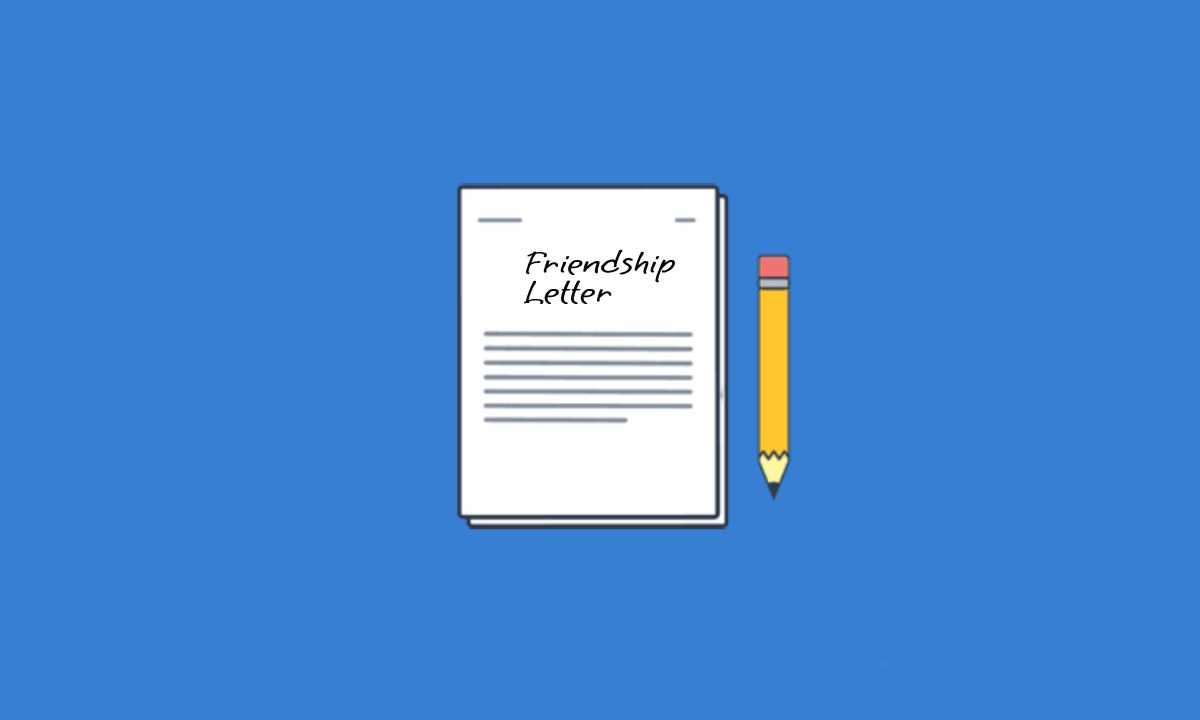
How to Write a Friendship Letter
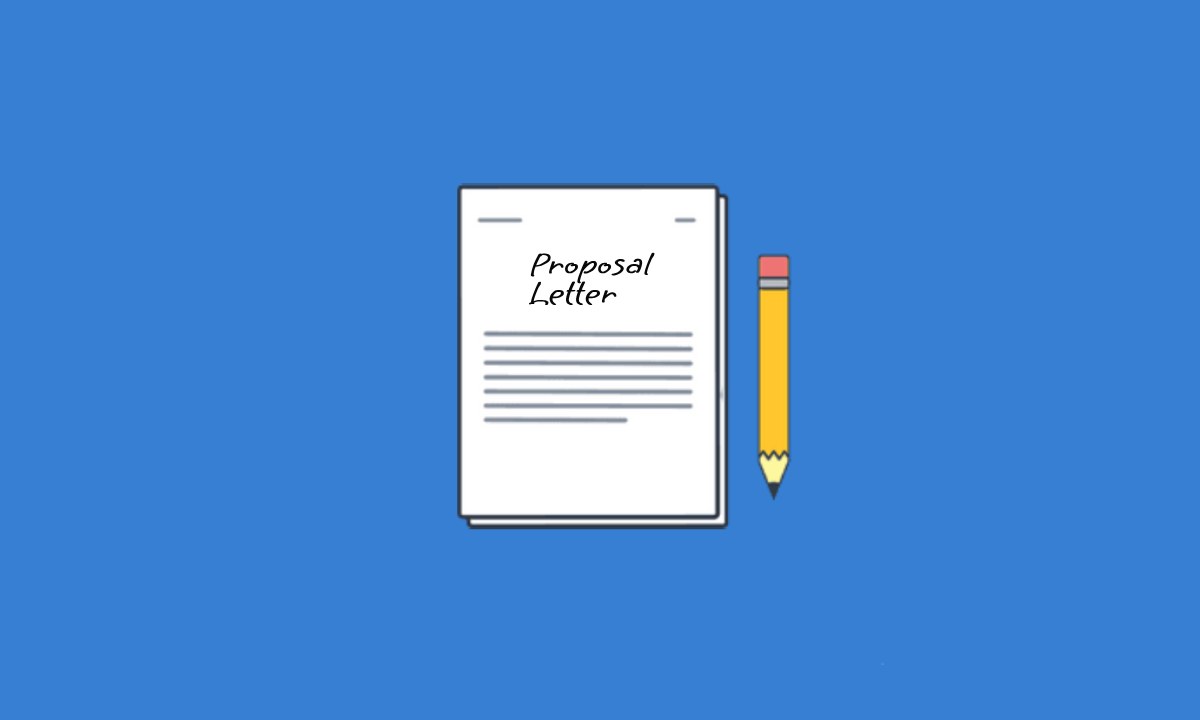
How to Write Proposal Letter to Offer Services

How to Write a Thank You Letter
Writing papers doesn't always come easy, ordering essays from us does.
My Paper Writer
166 Great Concept Papers Topics To Choose From

We often get students that want to know “What is concept paper?” A concept paper is basically a trial run. Students write a paper about what it is they want to research and write about. Concept paper examples that have earned high grades, across all subjects, show that they don’t go more than 3 pages in length. The key to writing a great concept assignment is to consider several concept paper ideas and concept papers topics and choose the one that is interesting and manageable given any restrictions.
Table of Contents
Great concept analysis papers for high school, concept analysis papers for college courses, concept paper topic ideas for graduate courses, interesting concept analysis paper topics, nursing concept analysis paper ideas, describe a topic idea or concept, research concept paper topics for a quick project, concept essay topic ideas for a presentation, writing a concept paper.
The first thing students need to consider when doing an assignment is what makes a good topic to research and write about. Students can spend hours searching online for ideas. But this can put them at risk of turning in late assignments. We are a professional educational writing and editing company that knows how hard it can be to come up with a great topic. This list of concept essay topics is free to share and customize for any type of assignment at any level:
Students in high school should consider these topics for a concept essay because they are easier to research and write about, allowing students to get the hang of this type of assignment:
- Equality among races in the workplace.
- The rights afforded to criminals before prosecution.
- The meaning of freedom in the 21st century.
- The way technology influences human interaction.
- Ambition among today’s youth and the future of business.
- Modern popular music and its impact on America’s youth.
- Love in the modern age and its impact on how people view relationships.
- Men and women in the 20th-century professional world.
- The meaning of pessimism in today’s society.
- The commercialization of sports and paying student-athletes.
- Television culture and the impact it has on young people.
- Classic television shows of the 1960s and the lost art of storytelling.
- The Olympics and the impact they have on athleticism.
- The ways power impacts political decisions and public policy.
- The effects health has on the public and its behavior.
- Sports and their impact on public perception.
- Impact of chemical use in creating products.
- Concept analysis of the fake news phenomena.
- The problems with Big Pharma’s public interests.
- Concept analysis of the efforts made to stop human trafficking.
This set of conceptual paper topics are more challenging and will require more in-depth research. Begin with a background search on the web, and then head to the library to find trustworthy resources:
- Resume writing in the U.S., Canadian, and European markets.
- The impact modern artists have on modern cultures.
- Concept analysis of the current healthcare system in the U.S.
- The best methods to reduce the gap between classes.
- The impact of technology facilitating the mapping of our cities.
- The ways gender roles are portrayed in different
- The one-child policy in China and the influence it has on the World.
- Physical therapy to help elderly patients recover from injuries.
- The differences between the Harlem Renaissance and the Compton Renaissance.
- Evolution of music throughout the digital age.
- The concept of starting a business in today’s economy.
- The concept of political parties accepting cash from corporations.
- The portrayal of minorities in the media and common culture.
- The effectiveness of yoga and stretching exercises in preventing injury.
- The impact that international music will have on future generations.
- The concept of organizing a study group to improve grades.
- An analysis of the biggest political decisions in the last half-century.
- The concept of religious donations for political reasons.
- Concept analysis of the use of marijuana to treat cancer patients.
- The effectiveness of athlete training programs in professional sports.
In most cases, the best thing to write about is a topic you already have some background in. These ideas might fit your needs so that you don’t need to put in too much extra work:
- Low socio-economic areas and high crime rates among the population.
- Social causes of depression and suicide among teens.
- Freedom of Press in the age of technology and the 21st century.
- Concept analysis of doctor-assisted suicide in the United States.
- The sense of community and belonging in American society.
- The concept of winning championships and the effect on local economies.
- Privileges and increased opportunities in modern society.
- Concept analysis of statistical relevance in business decisions.
- Class, gender, and race in the United States.
- Predicting social confidence in children starting school.
- The purpose of the press in disseminating information to the public.
- Concept analysis of isolated teenagers and the increased risk of violence.
- The concept of social capital in the professional world.
- Ethical theories in the medical field.
- Social interaction among teenagers in the time of social media.
- The importance of mental health for professional athletes.
- The social impact that printing more money has on society.
- The impact on education when teachers force their products on students.
- The ways online learning degrees have changed how people view education.
- Concept analysis of the most important business skills.
Students should be able to present a high-level assignment on any given topic When it comes to choosing a project, they are more likely to stick with interesting ideas:
- Socialist governments and the provision of services to their citizens.
- Maintaining a healthy weight during college.
- Setting up a website to increase a company’s brand awareness.
- Utilizing statistical information toward gambling in sports.
- The ways social inequality passes from generation to generation.
- Concept analysis of social mobility in the 21st century.
- The state of social and economic justice in the United States.
- Maintaining social distancing in a post-Covid-19 world.
- Concept analysis of monarchies around the world.
- Travel is a great way to broaden one’s thinking and perception of the world.
- Working from home to improve productivity.
- Balancing work life and personal life for mental health.
- Keeping a clean workspace to increase productivity.
- Exercising outside for better physical and mental health.
- Ethnic differences in wealth and health.
- Concept analysis of the relationship between financial security and health.
- Business management skills in education to prepare for the future.
- Anti-discrimination laws and their impact on people with disabilities.
- Concept analysis on the skills it takes to be a politician.
- Analysis of the laws and the people that write them.

If you are interested in the nursing field and have several weeks to work on a project, there is a lot of background information you can find online and in medical journals to put together a great paper:
- Concept analysis of patient-centered care in healthcare facilities.
- Concept analysis of healthcare coverage in the United States.
- Concept analysis of the challenges nurses face with limited resources.
- Concept analysis of the pay rates in nursing.
- Concept analysis of the ethics nurses must follow to provide adequate care.
- Concept analysis of the quality of care in nursing homes.
- Concept analysis of having nursing oversight committees at healthcare facilities.
- Concept analysis of restricting nurses from working overtime.
- Concept analysis of the use of technology in the nursing field.
- Concept analysis of ongoing education in the nursing field.
- Concept analysis of the treatment of patients with dementia.
- Concept analysis of the relationship between nurses and patients.
- Concept analysis of the effectiveness of home nursing.
- Concept analysis of the relationship between nurses and doctors.
- Concept analysis of the healthcare afforded to student athletes.
- Concept analysis of the challenges on effective maternal care.
- Concept analysis of current nursing practices.
- Concept analysis of educational quality in the field of nursing.
- Concept analysis of the nursing profession and overall health information.
- Concept analysis of how nurses influence healthy weight in people.
This fresh list of concept paper topics cover a wide variety of subjects and can be thoroughly researched by going online and then heading to the library for trustworthy resources:
- Describe the impact fracking has on the environment.
- Describe the effect self-driving vehicles will have on public safety.
- Describe why no one should be allowed to use cell phones while driving.
- Describe what the new NCAA NIL rules will do for college sports.
- Describe how investing in alternative energies affects the economy.
- Describe how the NCAA negatively impacts academic performance.
- Describe the effect the #MeToo Movement had around the world.
- Describe how the death penalty stops people from committing heinous crimes.
- Describe the consequences of genetic engineering.
- Describe the impact noise pollution has on mental health.
- Describe the best methods for maintaining a healthy weight.
- Describe a sports record that will likely never be broken.
- Describe the dangers of genetic cloning of extinct animals.
- Describe the impact illegal immigration has on a country’s services.
- Describe the importance of having physical education in the school system.
- Describe the effects of too much internet use.
- Describe how social media sites violate a person’s personal information.
- Describe the impact a mandatory vaccination rule in schools could help society.
- Describe the affect GMOs have on people.
- Describe the impact governments have by addressing climate change.
These ideas are geared toward students that have just a few days to work on a project. Still, there is ample research to be done and students must commit several hours to complete these topics:
- Students and their rights to pick preferred subjects early in life.
- Internet limitations for people under the age of 18.
- Making college education free to everyone.
- The impact that commercializing business will have on future generations.
- The importance of learning a second language.
- The economic impact smoke bans will have.
- The effects federal policy will have if people allow younger voting.
- The impact conscription laws have on the youth.
- Concept analysis of Americans diets versus European diets.
- Concept analysis of early tobacco commercials on America’s youth.
- Concept analysis of the modern celebrity.
- Analysis of the United State’s interactions with corrupt countries.
- The advantages a Western educational experience offers Asian students.
- The government’s role in funding social movements against policy.
- The government’s authority to ban same-sex marriages.
- The impact that lowering the voting age will have on a nation.
- Current school policies in the United States.
- Concept analysis of the efforts being made to reverse global warming.
- The effect a ban on cloning technology will have on medicine.
- The effect that wasting time at work has on the economy.
If you are putting together a presentation, the following concept papers topics can be easily researched and put together for academic or professional audiences:
- The impact that making abortion federally legal has on the economy.
- The ways that putting a smoking ban in public buildings will improve public health.
- The negative impact of drinking sugar-filled energy drinks.
- The effects an alcohol ban would have on modern society.
- The effects of year-round school schedules.
- Concept analysis of inclusion programs in school.
- The different effects the Industrial Revolution had on Europe and America.
- The impact of raising the drinking age to 25 in the U.S.
- Taxing the alcohol industry more to combat alcoholism.
- The impact homework has on learning.
- Deforestation and the impact it has on nations’ economies.
- The impact global warming has had on the rise of natural disasters.
- Concept analysis on the pros and cons of globalization.
- The definition of being a great politician in today’s world.
- The fairness of anti-discrimination laws.
- Concept analysis for the way the U.S. punishes politicians that break the law.
- The effectiveness of gun control in the United States.
- The ability to overturn jury decisions through appeals.
- Concept analysis for keeping security guards in the school.
- The overregulation of society.
- The influence the U.S. and China have in deterring WWIII.
- The impact the U.S. has had on global eco systems.
- Concept analysis of commercials aired during children’s programs.
- The effect limiting television time will have on children.
- Concept analysis of the current school schedule.
- Concept analysis of equal treatment among children.
After you have chosen a concept paper topic that you are comfortable with, it’s time to get to the hard work. Now, how to write a strong assignment that gets you a high grade? These five steps should help simplify the process:
- Step 1: Start with a Research Session. After selecting a concept paper topic, start searching for material on the web. This will show you what the current issues are. Thereafter, head to the school library and find supporting information from trustworthy resources.
- Step 2: Use an Example of Concept Paper. When you put together an outline for your paper, you should have a look at an example so you can understand the proper structure and can align your notes to fit what is required in this type of assignment. You can find examples on the web or we can provide one for you written from scratch.
- Step 3: Write a First Paper Draft. As soon as you have an outline, it’s time to start writing the first paper draft. Refer to outline often, fleshing out the basic ideas and following the order in which you have listed them. Try not to stop to make corrections or to come up with the perfect word or phrasing. Write as quickly as possible.
- Step 4: Revise Your First Draft. Because you are encouraged to write the first paper draft quickly, you will want to spend some time away from your work so that you can make revisions with a fresh perspective. Reimagine your arguments, and consider how you can improve them by adding, removing, or rearranging content.
- Step 5: Make Final Edits and Proofread. Finally, you’re ready to make final edits and proofread for mistakes. These two exercises should be done separately. Edit for word choice and sentence structure. You want your ideas to come through clearly and concisely. Then proofread for errors in spelling, grammar, and punctuation.
Our expert writers and editors are ready to help college and university students create high-quality assignments at a cheap price. But don’t let our low-cost services fool you; our professional writers are among the best in the business. We guarantee you will get the top-notch research paper writing help you need to achieve academic success.
What are the topics in the concept paper?
Some topics in concept paper include the increase in crime rates in low socio-economic areas and the social causes of depression and suicide among teenagers. Other topics to consider include the influence of Freedom of the Press in the 21st century or doctor-assisted suicide in the United States.
What are the 3 types of concept papers?
There are two types of concept papers, namely implicit concept papers and explicit concept papers. An implicit concept paper is like a prototype. It is meant to store casual information that conventional papers usually omit. Explicit concept papers include both casual and statistical information about a particular subject.
What is a concept paper example?
A concept paper example can include questions on how social confidence can be predicted in children starting school or the role of the press in spreading information to society. Others include the concept analysis of isolated teens and the rising risk of violence, social capital in the business world, and analyzing ethical theories and practices in medicine.
What are some interesting concept paper topics about education?
Some concept paper topics about education include the impact of teachers using force on students and how online learning degrees have changed educational perspectives.
Are there any interesting concept research paper topics?
Some interesting concept research paper topics can focus on the challenges of maintaining a healthy weight as a college student, the use of statistics in sports gambling, and social mobility in the 21st century. Other topics include whether socialist governments provide enough for their citizens and how social inequality is passed down from generation to generation.
Leave a Reply Cancel reply
Secure the top grades, with vetted experts at your fingertips.
Custom Essay, Term Paper & Research paper writing services
- testimonials
Toll Free: +1 (888) 354-4744
Email: [email protected]
Writing custom essays & research papers since 2008
40 catchy concept papers topics to amuse your prof.

It’s not easy to come around topics for concept papers that you can confidently present to your professor. However, we understand this great and urgent need, so we came up with this useful post.
What is a Concept Paper?
It is an academic paper briefly written to provide a clear summary of the research project. In short, it acts as a prelude to the primary research paper that will be presented.
Why do you need a concept paper?
Your lecturer will know what your thesis, project, or research paper is all about through your concept paper. Need I explain how long such projects are and how busy the professors are too?
In a concept paper, you develop an idea and bring it out for others to understand. Since it is short, you should master the art of using words conservatively while communicating effectively.
For example, if you are a Mass Communication student, you might want to study why fake news spreads faster than factual news. Or perhaps, you would explore why most media stations are privately owned. The list goes on to infinity.
Principles of Writing A Concept Analysis Paper
As with every type of academic paper , this, too, has its standards. Looking at a sample concept paper alone may not give you an accurate outline or writing format. That is why we have compiled these writing guidelines for you!
- The number of pages: Concept papers are typically short documents of 2-3 pages.
- Spacing: A double spacing to make the paper easy to read through
- Font size: Use a 12-point size, which is standard and readable.
- Margins: 1 inch all around is better
On top of the formatting aspects discussed above, there is also language use. Ensure that you use action-oriented language to communicate your ideas in your paper. Instead of using the statement, “could potentially help” opt for “will curtail, will certainly improve productivity, etc.”
When writing your concept paper, the following areas should be of significant focus: Arguments that address the main idea Bring out areas of controversy Point out areas of incomplete knowledge Historical and germinal works supporting your paper The composition of the concept paper should be as follows: The topic should be in the form of a question Conduct a brief overview of the research topic Briefly state the research questions that the project seeks to find answers to Why is the research necessary? A brief description of your research methodology
Let us look at a list of topic ideas for a concept paper:
Concept Paper Topic Ideas in Environment
- Are acid rains solely connected to industries and diesel vehicles alone?
- Is global warming a natural cycle of the earth?
- Can humanity benefit from forests without having to cut down trees?
- Has the coronavirus helped in reclaiming Mother Nature due to the lockdowns?
- Is humanity doing the best it can to protect endangered animal and plant species?
- Is deep-sea oil mining well for the aquatic life in the sea?
Concept Paper Topics in Health
- Have we done enough to prevent the occurrence and spread of another pandemic like COVID-19?
- Is what was considered healthy in the ancient past still considered healthy now?
- Why have there been more psychological causes of depression and anxiety during coronavirus?
- Why have African countries experienced low numbers of COVID-19 infections and death compared to Western countries?
- Why is cancer still the most dangerous disease in the 21st century?
- Is plastic surgery right for the health of the patients? Are there any side effects?
Concept Papers Ideas in Education
- Why is it a challenge to implement online learning for middle and high school students?
- What is the role of technology in enhancing research and innovations?
- Should all countries adopt the same learning curriculum for schools?
- Are long holidays proving to be detrimental to students rather than helpful?
- How much homework should a student have?
- Who is to blame for bullying cases in schools?
Concept Paper Ideas in Technology
- Why should countries adopt the 5G network?
- Are mobile companies spying on their clients?
- Why is hacking still a significant problem despite the technological advances made?
- Is it safe to use infrared and laser beams on humans?
- What is the role of technology in combating crime and terrorism?
- How can we enhance data privacy and security in the wake of mass data?
Concept Paper Topic Ideas in History
- Who is to blame for the Euthanasia project in the concentration camps?
- Is there a cold war among nations because of the I and II World War?
- Why the American flag has stars
- What are the reasons for slavery?
- Did explorers determine the sizes of countries as they are today?
- Is colonialism still persistent today?
Concept Topics in Family
- What causes divorce?
- Are children to blame for marriage break ups?
- How to live with drunken parents
- How to cope with grief in the family
- Problems associated with fostering a child
Controversial Concept Writing Topics
- Is abortion an ending of life?
- Is same-sex marriage legal?
- Should sex education be introduced in middle school?
- Children and advertising
- Surrogate mothers
We offer cheap, professional research paper writing help for college and university students. Get your paper done now!
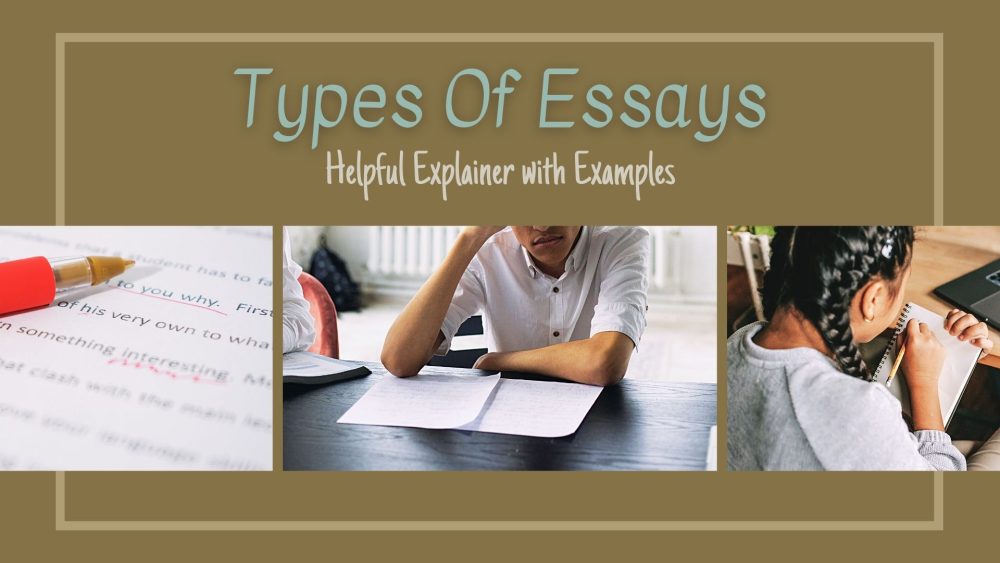
How to Write a Concept Paper in 7 Steps

Before you can write a research paper, or begin your research, you may have to write a concept paper.
A concept paper is a short academic paper that explains the research you plan to conduct. It covers your research goals, how you’ll carry out the research, how you’ll collect data, and the questions you aim to answer through your research.
Give your writing extra polish Grammarly helps you communicate confidently Write with Grammarly
What is a concept paper?
A concept paper is typically a two- to three-page paper that concisely explains a proposed research project. If the paper is for a funding application, it may be twenty pages or longer.
In the paper, they demonstrate why their proposed project is worthwhile. The paper covers:
- Research goals
- Questions the research aims to answer
- The research methods the author will use
- The types of data that will be collected
A concept paper is also known as a research proposal. They may be submitted to investors to secure funding, or a student may submit one to their supervisor before starting a research project. Through reading a student’s concept paper, an academic supervisor can assess their project’s feasibility and, if necessary, suggest adjustments the student can make to improve their project so it’s more realistic or valuable. Similarly, prospective investors can decide whether a project is something they’d like to support. Undeveloped or unrealistic projects can end at the concept paper stage
7 steps for writing a concept paper
A concept paper’s title should directly express the paper’s content. Think of it as a preview for the reader. The title can be the question the proposed project aims to answer, or it can be a short statement that summarizes the paper.
2 Introduction outlining problem and gaps in knowledge
In the introduction section, provide an overview of your research project. This should include a short overview of the current state of your research area and existing gaps in this area. After explaining these, state which of these knowledge gaps you aim to fill with your research. This section should also mention any contradictory theories regarding the questions you aim to answer.
3 Mission statement
Your concept paper’s introduction should also include a mission statement . This is a sentence or two that concisely states your research purpose in an engaging way. Remember, the goal is to get your project approved—so your mission statement should communicate why the reader’s approval will benefit your field.
4 Research aim
Your concept paper also needs to address the reason why you’re conducting the specific research you’ve planned. This part, along with the following two sections, are sometimes grouped together as a concept paper’s project description.
In this section, cover the following:
- The reason why your research is important
- The questions you aim to answer through your research
5 Methodology
A concept paper also needs to discuss the methodology you plan to use while conducting your research. This is the strategy or strategies you will use to collect data, such as:
- Experiments
- Case studies
- Observations
This section should also include any ethical concerns that could arise during the research period.
6 Outline of proposed methods and potential impact
After describing your proposed methodology, write a section that discusses exactly how you’ll conduct your research using these methods. Be as specific as possible—if you plan to utilize resources like specialized equipment or collaborate with an expert in your field, include this information in this section. In this section, outline how long you expect the research to take and note the specific milestones you plan to hit during that time frame.
This section should also discuss your research’s potential impact. Discuss who your research and results will impact and how it will impact them. For example, you might conduct a study on undergraduate sleep schedules and publish a paper that supports campus-wide policy changes that promote healthy sleep cycles for students who live on campus.
A concept paper also needs to include a section that addresses the project’s budget. The section should explain the overall cost and break it down into individual expenses so readers can see exactly how the money will be spent.
Tips for writing a concept paper
Write to your audience.
A concept paper is a piece of academic writing, so use a professional tone . Avoid colloquialisms, slang, and other conversational language. Your concept paper should use the same tone and style as your accompanying research paper.
Write according to your reader’s familiarity with the subject of your concept paper. For example, if you’re proposing an IT project and your intended reader is the head of your university’s IT department, you can use technical jargon they will understand. If the intended reader is somebody in a non-technical role, avoid jargon and make sure you define every vocabulary word that might not be familiar to them. By ensuring your reader understands your concept paper, you increase the likelihood of them approving your project.
Use an engaging, accurate title
Just like a clear, intriguing subject line increases the likelihood of a recipient reading an email, an engaging title increases the likelihood of your reader not only reading your concept paper but understanding it. Choose a title that’s concise (fewer than 15 words or so) and accurately reflects your paper’s content. After reading your paper’s title, your reader should not be surprised by your proposed research.
Keep it to an appropriate length
If you’re a student writing a concept paper for an undergraduate, master’s, or doctoral project, two to three pages is generally the right length for your paper. Don’t worry about getting too detailed about the specifics of your research; a high-level overview is sufficient.
Concept papers meant to secure funding from investors can be longer than academic concept papers.
How is a concept paper different from a research paper?
The main difference between a concept paper and a research paper is when they’re written in relation to a research project. A concept paper is written before its author begins their research, and a research paper is written after they’ve completed it. In other words, a concept paper introduces readers to its author’s academic project, and a research paper explains the outcome of the project.
Concept paper FAQs
A concept paper is often a two- to three-page paper that concisely explains a proposed research project.
When do you need a concept paper?
You need a concept paper to outline a proposed research project. Often, they are part of undergraduate, graduate, and doctoral research proposals. It’s also common for entrepreneurs and individuals conducting scientific and public-service-related research to write concept papers to garner support for their work.
What are the main steps of writing a concept paper?
Write an engaging, accurate title
- Outline the problem you aim to solve
- Write a mission statement
- Explain your research aim
- Explain your research methodology
- Explain your research methods and the potential impact of your work
- Discuss your project’s budget and how it will be allocated
While a concept paper introduces a proposed research project by outlining its purpose, process, and goals, a research paper discusses a completed project in detail.

How To Write a Concept Paper for Academic Research: An Ultimate Guide
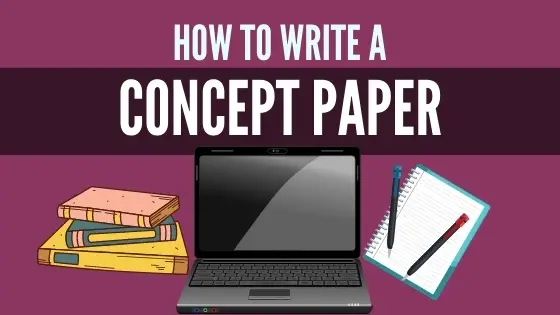
A concept paper is one of the first steps in helping you fully realize your research project. Because of this, some schools opt to teach students how to write concept papers as early as high school. In college, professors sometimes require their students to submit concept papers before suggesting their research projects to serve as the foundations for their theses.
If you’re reading this right now, you’ve probably been assigned by your teacher or professor to write a concept paper. To help you get started, we’ve prepared a comprehensive guide on how to write a proper concept paper.
Related: How to Write Significance of the Study (with Examples)
Table of Contents
What is the concept paper, 1. academic research concept papers, 2. advertising concept papers, 3. research grant concept papers, concept paper vs. research proposal, tips for finding your research topic, 2. think of research questions that you want to answer in your project, 3. formulate your research hypothesis, 4. plan out how you will achieve, analyze, and present your data, 2. introduction, 3. purpose of the study, 4. preliminary literature review, 5. objectives of the study, 6. research questions and hypotheses, 7. proposed methodology, 8. proposed research timeline, 9. references, sample concept paper for research proposal (pdf), tips for writing your concept paper.
Generally, a concept paper is a summary of everything related to your proposed project or topic. A concept paper indicates what the project is all about, why it’s important, and how and when you plan to conduct your project.
Different Types of the Concept Paper and Their Uses

This type of concept paper is the most common type and the one most people are familiar with. Concept papers for academic research are used by students to provide an outline for their prospective research topics.
These concept papers are used to help students flesh out all the information and ideas related to their topic so that they may arrive at a more specific research hypothesis.
Since this is the most common type of concept paper, it will be the main focus of this article.
Advertising concept papers are usually written by the creative and concept teams in advertising and marketing agencies.
Through a concept paper, the foundation or theme for an advertising campaign or strategy is formed. The concept paper can also serve as a bulletin board for ideas that the creative and concept teams can add to or develop.
This type of concept paper usually discusses who the target audience of the campaign is, what approach of the campaign will be, how the campaign will be implemented, and the projected benefits and impact of the campaign to the company’s sales, consumer base, and other aspects of the company.
This type of concept paper is most common in the academe and business world. Alongside proving why your research project should be conducted, a research grant concept paper must also appeal to the company or funding agency on why they should be granted funds.
The paper should indicate a proposed timeline and budget for the entire project. It should also be able to persuade the company or funding agency on the benefits of your research project– whether it be an increase in sales or productivity or for the benefit of the general public.
It’s important to discuss the differences between the two because a lot of people often use these terms interchangeably.
A concept paper is one of the first steps in conducting a research project. It is during this process that ideas and relevant information to the research topic are gathered to produce the research hypothesis. Thus, a concept paper should always precede the research proposal.
A research proposal is a more in-depth outline of a more fleshed-out research project. This is the final step before a researcher can conduct their research project. Although both have similar elements and structures, a research proposal is more specific when it comes to how the entire research project will be conducted.
Getting Started on Your Concept Paper
1. find a research topic you are interested in.
When choosing a research topic, make sure that it is something you are passionate about or want to learn more about. If you are writing one for school, make sure it is still relevant to the subject of your class. Choosing a topic you aren’t invested in may cause you to lose interest in your project later on, which may lower the quality of the research you’ll produce.
A research project may last for months and even years, so it’s important that you will never lose interest in your topic.
- Look for inspiration everywhere. Take a walk outside, read books, or go on your computer. Look around you and try to brainstorm ideas about everything you see. Try to remember any questions you might have asked yourself before like why something is the way it is or why can’t this be done instead of that .
- Think big. If you’re having trouble thinking up a specific topic to base your research project on, choosing a broad topic and then working your way down should help.
- Is it achievable? A lot of students make the mistake of choosing a topic that is hard to achieve in terms of materials, data, and/or funding available. Before you decide on a research topic, make sure you consider these aspects. Doing so will save you time, money, and effort later on.
- Be as specific as can be. Another common mistake that students make is that they sometimes choose a research topic that is too broad. This results in extra effort and wasted time while conducting their research project. For example: Instead of “The Effects of Bananas on Hungry Monkeys” , you could specify it to “The Effects of Cavendish Bananas on Potassium-deficiency in Hungry Philippine Long-tailed Macaques in Palawan, Philippines”.
Now that you have a general idea of the topic of your research project, you now need to formulate research questions based on your project. These questions will serve as the basis for what your project aims to answer. Like your research topic, make sure these are specific and answerable.
Following the earlier example, possible research questions could be:
- Do Cavendish bananas produce more visible effects on K-deficiency than other bananas?
- How susceptible are Philippine long-tailed macaques to K-deficiency?
- What are the effects of K-deficiency in Philippine long-tailed macaques?
After formulating the research questions, you should also provide your hypothesis for each question. A research hypothesis is a tentative answer to the research problem. You must provide educated answers to the questions based on your existing knowledge of the topic before you conduct your research project.
After conducting research and collecting all of the data into the final research paper, you will then have to approve or disprove these hypotheses based on the outcome of the project.
Prepare a plan on how to acquire the data you will need for your research project. Take note of the different types of analysis you will need to perform on your data to get the desired results. Determine the nature of the relationship between different variables in your research.
Also, make sure that you are able to present your data in a clear and readable manner for those who will read your concept paper. You can achieve this by using tables, charts, graphs, and other visual aids.
Related: How to Make Conceptual Framework (with Examples and Templates)
Generalized Structure of a Concept Paper
Since concept papers are just summaries of your research project, they are usually short and no longer than 5 pages. However, for big research projects, concept papers can reach up to more than 20 pages.
Your teacher or professor may give you a certain format for your concept papers. Generally, most concept papers are double-spaced and are less than 500 words in length.
Even though there are different types of concept papers, we’ve provided you with a generalized structure that contains elements that can be found in any type of concept paper.
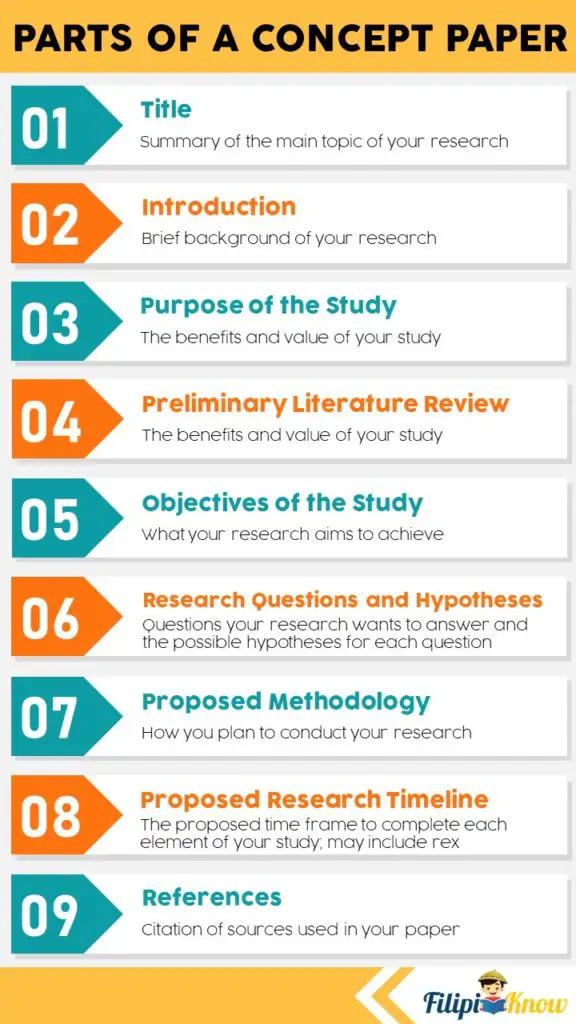
The title for your paper must be able to effectively summarize what your research is all about. Use simple words so that people who read the title of your research will know what it’s all about even without reading the entire paper.
The introduction should give the reader a brief background of the research topic and state the main objective that your project aims to achieve. This section should also include a short overview of the benefits of the research project to persuade the reader to acknowledge the need for the project.
The Purpose of the Study should be written in a way that convinces the reader of the need to address the existing problem or gap in knowledge that the research project aims to resolve. In this section, you have to go into more detail about the benefits and value of your project for the target audience/s.
This section features related studies and papers that will support your research topic. Use this section to analyze the results and methodologies of previous studies and address any gaps in knowledge or questions that your research project aims to answer. You may also use the data to assert the importance of conducting your research.
When choosing which papers and studies you should include in the Preliminary Literature Review, make sure to choose relevant and reliable sources. Reliable sources include academic journals, credible news outlets, government websites, and others. Also, take note of the authors for the papers as you will need to cite them in the References section.
Simply state the main objectives that your research is trying to achieve. The objectives should be able to indicate the direction of the study for both the reader and the researcher. As with other elements in the paper, the objectives should be specific and clearly defined.
Gather the research questions and equivalent research hypotheses you formulated in the earlier step and list them down in this section.
In this section, you should be able to guide the reader through the process of how you will conduct the research project. Make sure to state the purpose for each step of the process, as well as the type of data to be collected and the target population.
Depending on the nature of your research project, the length of the entire process can vary significantly. What’s important is that you are able to provide a reasonable and achievable timeline for your project.
Make sure the time you will allot for each component of your research won’t be too excessive or too insufficient so that the quality of your research won’t suffer.
Ensure that you will give credit to all the authors of the sources you used in your paper. Depending on your area of study or the instructions of your professor, you may need to use a certain style of citation.
There are three main citation styles: the American Psychological Association (APA), Modern Language Association (MLA), and the Chicago style.
The APA style is mostly used for papers related to education, psychology, and the sciences. The APA citation style usually follows this format:
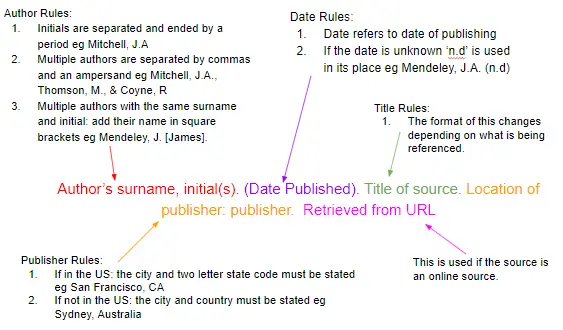
The MLA citation style is the format used by papers and manuscripts in disciplines related to the arts and humanities. The MLA citation style follows this format:
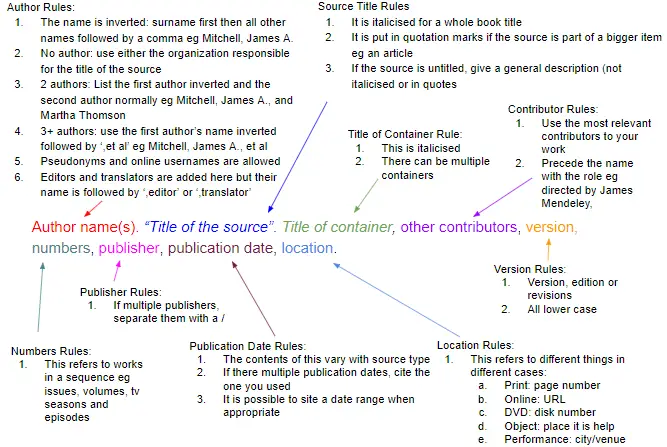
The Chicago citation style is usually used for papers related to business, history, and the fine arts. It follows this citation format:

This is a concept paper sample provided by Dr. Bernard Lango from the Jomo Kenyatta University of Agriculture and Technology (modified for use in this article). Simply click the link above the download the PDF file.
- Use simple, concise language. Minimize the use of flowery language and always try to use simple and easy-to-understand language. Too many technical or difficult words in your paper may alienate your readers and make your paper hard to read.
- Choose your sources wisely. When scouring the Internet for sources to use, you should always be wary and double-check the authenticity of your source. Doing this will increase the authenticity of your research project’s claims and ensure better data gathered during the process.
- Follow the specified format, if any. Make sure to follow any specified format when writing your concept paper. This is very important, especially if you’re writing your concept paper for class. Failure to follow the format will usually result in point deductions and delays because of multiple revisions needed.
- Proofread often. Make it a point to reread different sections of your concept paper after you write them. Another way you can do this is by taking a break for a few days and then coming back to proofread your writing. You may notice certain areas you’d like to revise or mistakes you’d like to fix. Make proofreading a habit to increase the quality of your paper.
Written by Ruth Raganit
in Career and Education , Juander How
Ruth Raganit
Ruth Raganit obtained her Bachelor of Science degree in Geology from the University of the Philippines – Diliman. Her love affair with Earth sciences began when she saw a pretty rock and wondered how it came to be. She also likes playing video games, doing digital art, and reading manga.
Browse all articles written by Ruth Raganit
Copyright Notice
All materials contained on this site are protected by the Republic of the Philippines copyright law and may not be reproduced, distributed, transmitted, displayed, published, or broadcast without the prior written permission of filipiknow.net or in the case of third party materials, the owner of that content. You may not alter or remove any trademark, copyright, or other notice from copies of the content. Be warned that we have already reported and helped terminate several websites and YouTube channels for blatantly stealing our content. If you wish to use filipiknow.net content for commercial purposes, such as for content syndication, etc., please contact us at legal(at)filipiknow(dot)net


How to write a concept paper

One of Speedy Paper's most experienced academic writer and editor since 2015. A proud owner of a Master's degree in English from Stanford.
What is a concept paper? A concept paper introduces and summarizes a project or research topic in a brief, organized text. The initial proposal outlines the project's goals, methodology, and outcomes. Writing a concept paper might help you get money permission or arrange your thoughts before writing a proposal or research project. A concept paper should convince stakeholders or decision-makers that the project is possible and worthwhile.
I start writing a concept paper by considering my project's key goal. I must identify my main issue or query. A concept paper can easily get off track without a defined topic. A well-structured concept paper should explain why and how the project will be done. Addressing the project's possible impact will make readers believe its results are significant and relevant. Concept papers help you explain your ideas, from study proposals to company proposals.
A concept paper begins with a brief introduction, describes the problem or need, proposes a strategy, and discusses expected results. Writing a clear, precise concept paper sets the stage for future work. More organization and emphasis in your concept paper increases your chances of getting project support.
Key steps to writing a concept paper
If you want to know how to write a concept paper, you should follow a clear process to ensure your paper is effective and convincing. Here are the most important things I think you should do to write a good concept paper:
- Identify your main objective : Start by clarifying the main issue or question that your study or project will try to answer. The rest of the paper is built on top of this portion.
- Define your audience : It's very important to know who will read your concept paper. Knowing your audience can change how you talk, your tone, and the information you include.
- Consider using additional resources : If you're feeling overwhelmed or want to ensure the highest quality, you can seek help from a professional paper writer . These experts can provide guidance, help refine your ideas, and ensure your concept paper is well-structured and polished.
- Draft a working title : Even though it might change as you work on your paper, choose a title that quickly describes the project. A good title helps the reader understand the mood and setting.
- Write a concise introduction : Give important basic information about the subject and explain why it's important. The opening should grab the reader's attention and show why the project or study is important.
- Outline your methodology : Describe your steps to solve the issue or answer the question. In this part, you should talk about the resources, tools, and methods you will use to carry out the job.
- Discuss the expected impact : Make sure you know your project's possible results and perks. This part is very important if you need money or permission from people who matter.
- Include a timeline and budget (if applicable) : When you include the concept paper in a funding request, don't forget to include a basic project timeline and a cost estimate. It helps show that your idea is both possible and well-thought-out.
- Review and revise : Finally, ensure you read and edit your concept paper many times. It's important to make sure your final draft is polished and professional. Even small mistakes in language or clarity can hurt your trustworthiness.
If you follow these steps, your concept papers will be well-organized, convincing, and good at explaining your project's goals and worth.
Tips for enhancing a concept paper
Making your concept paper as clear, interesting, and professional as possible is what it means to improve it. Here are some important tips I've learned that will help you get better at writing a concept paper:
- Focus on clarity and coherence : It should be easy to follow your concept paper, with each part building on the one before. Your audience is more likely to understand and back your idea if your writing is clear.
- Know your audience : Make sure your concept paper fits the wants and demands of the people reading it. For example, donors might want to see many financial details, while academic judges might be more interested in your research methods and larger ideas.
- Revise and proofread thoroughly : Even small mistakes can make your concept paper look less credible. Make sure your paper is perfect and free of mistakes by carefully proofreading and revising it repeatedly.
- Be persuasive but realistic : It's important to stress how valuable and important your project could be, but make sure that what you say is backed up by facts and attainable goals. If you overstate the possible results, people will be less likely to believe your plan.
If you follow these tips, you can write a better concept paper that makes your project's importance and viability stand out. These tips will help keep your audience interested and ensure you know how to write a concept paper effectively.
Common challenges in writing a concept paper and how to overcome them
Writing concept papers can be hard, especially if you have never done it before or are working on a complicated project. However, these problems can be solved with careful strategy and planning. Keeping things clear throughout the paper is one of the most common problems. When writing about complicated subjects, it's simple to get sidetracked and give the reader too much data. To solve this problem, I suggest splitting your content into smaller, easier-to-handle parts, each focusing on a different part of the project.
Choosing how much information to include is another challenging part. From what I've seen, the key is finding a good mix between giving enough details to fully explain the idea and keeping the paper short. Too much information can make the paper hard to read, and not enough information can leave people with problems. Focusing on the most important parts of the project, like its goals, methods, and predicted effects, helps keep the paper clear and on track.
Putting things off is another common problem for people trying to write a concept paper. The process of writing a concept paper can seem overwhelming at first, but by breaking it down into smaller steps, it can be more doable. Create a sketch first, and then finish each part one at a time. Setting small goals that you can reach will keep you inspired and on track, and the result will be better planned and logical work. You can write a concept paper that successfully communicates your project's goals and possible effects if you understand and deal with these problems.
The difference between a concept paper and other academic papers
Writing a concept paper is unlike working on other kinds of school papers. One of the main differences is the goal of each paper. A concept paper is more about proposing an idea or project that hasn't been fully developed yet, while an academic paper is more about presenting study results or giving theoretical talks. To put it another way, a concept paper is usually the first step that sets the stage for future study or project execution.
The public is another important difference. Concept papers are usually written for people with a stake in the project, like funders, bosses, or decision-makers who might not be experts in the field. Because of this, a concept paper usually focuses on showing that the project is possible and has value rather than giving a deep analysis or study results. However, academic papers are usually written for smart people, focusing more on theory frameworks, literature studies, and data analysis.
Another thing that differentiates a concept paper from an academic paper is that its format is often more open to change. While academic papers usually have a tight structure with an introduction, methods, findings, and discussion, the structure of a concept paper can change based on the needs of the project or the organization. But both types of papers must be clear, make sense, and move logically. If you know how concept paper differs from other academic papers , you can approach each one with the right plan and attitude, ensuring that your writing meets the needs of the people you're writing it for. Be sure to check our blog for more useful writing guides!
Topic ideas for concept paper
Here are 15 topic ideas that can help inspire you when you write concept papers for various projects:
- Reduce urban transportation carbon emissions
- Providing quality education to underprivileged communities
- Investigating AI in healthcare diagnosis
- Promote sustainable tourism in vulnerable ecosystems
- Addressing the rural digital divide
- Improving veteran mental health treatments
- Affordable accommodation for low-income families
- Installing renewable energy in poor nations
- Reduce plastic waste in food packaging
- Improving cybersecurity for small businesses
- Social media's effect on political discourse
- Creating new climate change tactics
- Promoting gender equality in STEM education
- Addressing the mental health impacts of remote work
- Enhancing coastal city catastrophe readiness and response
Each topic provides a solid foundation for creating a compelling and relevant concept paper. When you write a concept paper, it’s essential to choose a meaningful and feasible topic, allowing you to clearly outline the objectives and expected outcomes of the project.
What is the purpose of a concept paper?
An idea or project should be outlined in a concept paper clearly and succinctly. The proposal describes the project's goals, methodology, and outcomes. A concept paper is intended to acquire financing or stakeholder support before more comprehensive planning or investigation.
How long should a concept paper be?
Usually, a concept paper is from two to five pages long. The idea is to provide the reader with enough information to comprehend the project without providing too much detail. Making the paper effective requires concision and coverage of all essentials.
What are the key components of a successful concept paper?
A good concept paper has a clear purpose, a well-defined audience, an introduction to the problem, a methodology section that outlines how the project will be conducted, and a discussion of projected outcomes. A financing proposal paper may include a timeframe and budget. These sections give a complete project overview, helping readers comprehend its worth and viability.
Is a concept paper required for all research projects?
Related articles.


What is the Importance of a Concept Paper and How to Write It

A concept paper is a brief document that outlines the main idea, objectives, and potential outcomes of a proposed research project. It is typically used as a pre-proposal to gather support and feedback for more extensive research projects and can also serve as a tool to secure funding. The primary purpose of a concept paper is to provide a clear and compelling argument for why the proposed research project is worth pursuing. It should include the research title, a brief statement of the problem, the significance of the research, the type of data to be collected, the planned research methods and the potential outcomes of the study.
Table of Contents
- Core elements of a concept paper
Keep it concise and to the point
Use clear and easy-to-understand language, provide a clear and compelling argument, tailor your concept paper to the specific funder, proofread and edit your concept paper, be specific when providing details.
An impactful concept paper is written in a way that can be easily understood by a wide range of readers, including those who may not have a background in the specific field of research. This is particularly important when seeking funding, as the concept paper will be used to convince potential funders of the importance and relevance of the research.
Core elements of a concept paper
Several key elements must be addressed and included in a concept paper to make it compelling enough to secure the funding needed for research.
- Create a clear and concise title, as this is one of the most essential elements of a concept paper. The title should be specific and descriptive and must be able to capture the reader’s interest. It should accurately reflect the main idea of the research project in a simple, easy-to-understand way. Avoid using complex language or making the title too lengthy.
- When writing the concept paper, explain the background for the research and provide a clear context for the proposed research project. Experts suggest including a brief overview of the current scenario and any relevant research that may have been conducted in the past. The paper should also explain the relevance of the research and why it is essential to pursue.
- Present a comprehensive literature review to highlight the gaps in knowledge that you plan to address in your research. It is essential to summarize relevant literature on the topic and highlight key studies and findings in the concept paper. This will help identify possible gaps in current research and explain how the proposed project aims to address these.
- Outline the problem statement accurately. The concept paper should include a problem statement that explains why the research topic needs to be investigated. It is crucial to clearly and concisely state the problem or research question that the proposed project aims to address.
- Share the methodology being followed in the research . Researchers must explain the research methods, sampling techniques, data collection processes, and data analysis plans in the concept paper. Remember also to explain why the specified methodology is appropriate for the study.
- Provide a realistic timeline for the research project in the concept note, one that states when specific milestones and deadlines are expected to be met. Explain the various stages of the research and how the results will be disseminated and reported to the funders.
Proven tips on writing an impactful concept paper
Early career academics and researchers often find writing a compelling concept paper to be a challenging task. To help make the process easier, we offer several simple tips that can help you write an effective concept paper to secure funding for your research. Here are some of the more important points to keep in mind:
A concept paper should provide a clear, brief and to-the-point overview of the proposed research project. Experts suggest keeping the concept paper short and using no more than five single-spaced pages. It is best to ensure that essential formatting elements like sub-heads and page numbers are used for easy reading.
Use language that is appropriate for the audience you are trying to address. Ideally, a concept paper should be written in a way that is easily understood, even by those who may not have a background in the specific field of research.
A concept paper should provide a clear and persuasive argument for why the proposed research project is worth pursuing and why it is essential to investigate. Using data and numbers to explain the project’s reasoning makes it more effective and interesting for readers.
When seeking funding for your research, it is important to tailor your concept paper to the particular funder. This includes addressing the specific funding priorities and requirements of the funder and explaining how your proposed research aligns with those priorities.
Before submitting it, be sure to proofread and edit it carefully to ensure that it is free of errors and clearly written.
This is important as sponsors will want to know how much funds are required. They will also seek details like how you plan to measure the progress of your research.
Given just how important it can be, it always helps to spend some time thinking about the best way to structure and present the concept paper. This will go a long way in helping you get the funding you require.
Paperpal is a comprehensive AI writing toolkit that helps students and researchers achieve 2x the writing in half the time. It leverages 21+ years of STM experience and insights from millions of research articles to provide in-depth academic writing, language editing, and submission readiness support to help you write better, faster.
Get accurate academic translations, rewriting support, grammar checks, vocabulary suggestions, and generative AI assistance that delivers human precision at machine speed. Try for free or upgrade to Paperpal Prime starting at US$19 a month to access premium features, including consistency, plagiarism, and 30+ submission readiness checks to help you succeed.
Experience the future of academic writing – Sign up to Paperpal and start writing for free!
Related Reads:
- How to Write a High-Quality Conference Paper
- How Long Should a Chapter Be?
- What are Journal Guidelines on Using Generative AI Tools
- How to Use Paperpal to Generate Emails & Cover Letters?
How to Write the First Draft of a Research Paper with Paperpal?
Introducing paperpal predictive text suggestions: transform ideas into words faster than ever , you may also like, what is the purpose of an abstract why..., research process steps: research procedure and examples, what are citation styles which citation style to..., what are the types of literature reviews , what are research skills definition, importance, and examples , what is phd dissertation defense and how to..., abstract vs introduction: what is the difference , mla format: guidelines, template and examples , machine translation vs human translation: which is reliable..., what is academic integrity, and why is it....

Community Blog
Keep up-to-date on postgraduate related issues with our quick reads written by students, postdocs, professors and industry leaders.
What is a Concept Paper and How do You Write One?
- By DiscoverPhDs
- August 26, 2020

What is a Concept Paper?
A concept paper is a short document written by a researcher before starting their research project, with the purpose of explaining what the study is about, why it is important and the methods that will be used.
The concept paper will include your proposed research title, a brief introduction to the subject, the aim of the study, the research questions you intend to answer, the type of data you will collect and how you will collect it. A concept paper can also be referred to as a research proposal.
What is the Purpose of a Concept Paper?
The primary aim of a research concept paper is to convince the reader that the proposed research project is worth doing. This means that the reader should first agree that the research study is novel and interesting. They should be convinced that there is a need for this research and that the research aims and questions are appropriate.
Finally, they should be satisfied that the methods for data collection proposed are feasible, are likely to work and can be performed within the specific time period allocated for this project.
The three main scenarios in which you may need to write a concept paper are if you are:
- A final year undergraduate or master’s student preparing to start a research project with a supervisor.
- A student submitting a research proposal to pursue a PhD project under the supervision of a professor.
- A principal investigator submitting a proposal to a funding body to secure financial support for a research project.
How Long is a Concept Paper?
The concept paper format is usually between 2 and 3 pages in length for students writing proposals for undergraduate, master’s or PhD projects. Concept papers written as part of funding applications may be over 20 pages in length.
How do you Write a Concept Paper?
There are 6 important aspects to consider when writing a concept paper or research proposal:
- 1. The wording of the title page, which is best presented as a question for this type of document. At this study concept stage, you can write the title a bit catchier, for example “Are 3D Printed Engine Parts Safe for Use in Aircraft?”.
- A brief introduction and review of relevant existing literature published within the subject area and identification of where the gaps in knowledge are. This last bit is particularly important as it guides you in defining the statement of the problem. The concept paper should provide a succinct summary of ‘the problem’, which is usually related to what is unknown or poorly understood about your research topic . By the end of the concept paper, the reader should be clear on how your research idea will provide a ‘solution’ to this problem.
- The overarching research aim of your proposed study and the objectives and/or questions you will address to achieve this aim. Align all of these with the problem statement; i.e. write each research question as a clear response to addressing the limitations and gaps identified from previous literature. Also give a clear description of your primary hypothesis.
- The specific data outputs that you plan to capture. For example, will this be qualitative or quantitative data? Do you plan to capture data at specific time points or at other defined intervals? Do you need to repeat data capture to asses any repeatability and reproducibility questions?
- The research methodology you will use to capture this data, including any specific measurement or analysis equipment and software you will use, and a consideration of statistical tests to help interpret the data. If your research requires the use of questionnaires, how will these be prepared and validated? In what sort of time frame would you plan to collect this data?
- Finally, include a statement of the significance of the study , explaining why your research is important and impactful. This can be in the form of a concluding paragraph that reiterate the statement of the problem, clarifies how your research will address this and explains who will benefit from your research and how.
You may need to include a short summary of the timeline for completing the research project. Defining milestones of the time points at which you intend to complete certain tasks can help to show that you’ve considered the practicalities of running this study. It also shows that what you have proposed is feasible in order to achieve your research goal.
If you’re pitching your proposed project to a funder, they may allocate a proportion of the money based on the satisfactory outcome of each milestone. These stakeholders may also be motivated by knowing that you intend to convert your dissertation into an article for journal publication; this level of dissemination is of high importance to them.
Additionally, you may be asked to provide a brief summary of the projected costs of running the study. For a PhD project this could be the bench fees associated with consumables and the cost of any travel if required.
Make sure to include references and cite all other literature and previous research that you discuss in your concept paper.
This guide gave you an overview of the key elements you need to know about when writing concept papers. The purpose of these are first to convey to the reader what your project’s purpose is and why your research topic is important; this is based on the development of a problem statement using evidence from your literature review.
Explain how it may positively impact your research field and if your proposed research design is appropriate and your planned research method achievable.

An academic transcript gives a breakdown of each module you studied for your degree and the mark that you were awarded.

Learning how to effectively collaborate with others is an important skill for anyone in academia to develop.

Stay up to date with current information being provided by the UK Government and Universities about the impact of the global pandemic on PhD research studies.
Join thousands of other students and stay up to date with the latest PhD programmes, funding opportunities and advice.

Browse PhDs Now

Find out the different dissertation and thesis binding options, which is best, advantages and disadvantages, typical costs, popular services and more.

Multistage sampling is a more complex form of cluster sampling for obtaining sample populations. Learn their pros and cons and how to undertake them.

Alex is a PhD student at the University of Bradford researching ritual and funerary rites in later prehistoric Scotland: an analysis of faunal assemblages from the Covesea Caves.

De-Shaine is 2nd Year Neurotechnology PhD Student at Imperial College London. His research looks at monitoring the brain when it’s severely injured after a traumatic brain injury or stroke and patients are in neurocritical care.
Join Thousands of Students

COMMENTS
What Is Concept Paper. A concept paper can be defined as a concise document which outlines the fundamental aspects of a grant proposal. It outlines the initial ideas, objectives, and theoretical framework of a proposed research project. It is usually two to three-page long overview of the proposal.
A concept paper is a concise document that outlines a proposed research project or study. It serves as a preliminary plan, presenting the research problem, objectives, significance, and proposed methodology.
The concept paper aim is to capture the thoughts and ideas while the research proposal captures the ideas in a structured manner for approval to research.
Research Concept Paper Topics for a Quick Project. Concept Essay Topic Ideas for a Presentation. Writing a Concept Paper. FAQ. The first thing students need to consider when doing an assignment is what makes a good topic to research and write about. Students can spend hours searching online for ideas.
Conduct a brief overview of the research topic; Briefly state the research questions that the project seeks to find answers to; Why is the research necessary? A brief description of your research methodology; Let us look at a list of topic ideas for a concept paper: Concept Paper Topic Ideas in Environment
A concept paper is a short academic paper that explains the research you plan to conduct. It covers your research goals, how you’ll carry out the research, how you’ll collect data, and the questions you aim to answer through your research.
1. Find a research topic you are interested in. Tips for finding your research topic. 2. Think of research questions that you want to answer in your project. 3. Formulate your research hypothesis. 4. Plan out how you will achieve, analyze, and present your data. Generalized Structure of a Concept Paper. 1. Title. 2. Introduction. 3.
A concept paper introduces and summarizes a project or research topic in a brief, organized text. The initial proposal outlines the project's goals, methodology, and outcomes. Writing a concept paper might help you get money permission or arrange your thoughts before writing a proposal or research project.
A concept paper is a brief document that outlines the main idea, objectives, and potential outcomes of a proposed research project. It is typically used as a pre-proposal to gather support and feedback for more extensive research projects and can also serve as a tool to secure funding.
A concept paper is a short document written by a researcher before starting their research project, with the purpose of explaining what the study is about, why it is important and the methods that will be used.